As new technology continues to evolve at a rapid pace, more and more Internet users are turning to the domain of online learning as a reliable and trustworthy resource of information. Using the World Wide Web as a means of learning about a particular subject or topic has become a commonplace learning technique for everyone from preschoolers, K-12, college students and even homeschooling and adult learners.
In a world where communicating and learning on the move are considered the norm, the Internet has become an invaluable virtual encyclopedia of information. With its ability to provide extensive information on about almost any topic, subject or news story in an instant, the internet is an invaluable resource used by all ages – from pre-schoolers, to High school students, 11 plus practice, sixth form students, academics, businesses and people who simply need to look up how to cook, complete an everyday task or find out what is happening in the world.
With so much information at our fingertips, it’s difficult to know what is true, relevant and reliable. Accessible to mass audiences, the Internet is a powerful tool that anyone can access 24 hours a day, 7 days a week. With the power to influence and shift opinions, it’s important to understand how to use the Internet effectively for learning, what to avoid, what you should use and how to make the most out of this powerful learning resource.
Here are some pros and cons to using the Internet for learning:
Online education through Tablets/Smartphones/ PC/Internet resources provide access to information and programs that have the ability to support, shape and enhance a student’s learning experience. With access to thousands of relevant and trustworthy sources of information, E-learning offers unparalleled ability to learn on the move, providing information whilst saving time.
Digital learning has also been proven to generate positive results, as people tend to engage with the information they see on a screen rather than traditional forms of rote learning . People have the freedom to decide when they want to learn, as they are not restricted to set timetables used in classroom learning. This also helps students to manage their time more effectively.
Another advantage of using the Internet as a learning resource is its flexibility and speed, allowing you to access real-time information and breaking news far quicker than a teacher or tutor could assimilate and deliver in a classroom environment. It also allows online users to absorb and utilize the information they find at their own pace. Interactive information available in various audio visual formats is more adept towards supporting individualization of learning style and methodology.
However, internet also packs various sources of distractions for students. It is sometimes even hard to qualify certain online learning resources as reliable or even true. Thus, before students are set on to the path of E-learning, it is important to direct them to only reliable sources that are referenced appropriately on reputable websites.
Internet is also a the place where users voice their own opinions, whether they are academically sound and logical or not. Students might harm from trying to learn from people through opinions, experiences without any sound fundamentals and theoretical knowledge. Students need to be made wary of learning and using information from online group discussions, debates, often triggered by the thoughts and opinions of others. Peer reviewed journals, articles, expert opinions, reliable E-books and professional subject study materials are the best media for Online learning.
While many think that internet learning will substitute the one-to-one interaction between students and teachers, the models of Flipped Classroom learning have in fact shown otherwise. With E-learning options, students can often take the classroom lecturing from the convenience of their home though lecture videos, online study materials and online tutors. The valuable time of classroom teaching can be utilized by the teacher to provide personalized study assistance and guidance to every student which is invaluable when it comes to learning about a subject area. The benefits of learning in the classroom would then be amplified rather than being under valued.
Are you in favor of the new teaching techniques of E-learning? Let us know your thoughts !




Very great post. I just stumbled upon your weblog and wished
to mention that I’ve truly loved surfing around your weblog posts.
After all I’ll be subscribing to your rss feed and I’m hoping
you write once morre very soon!